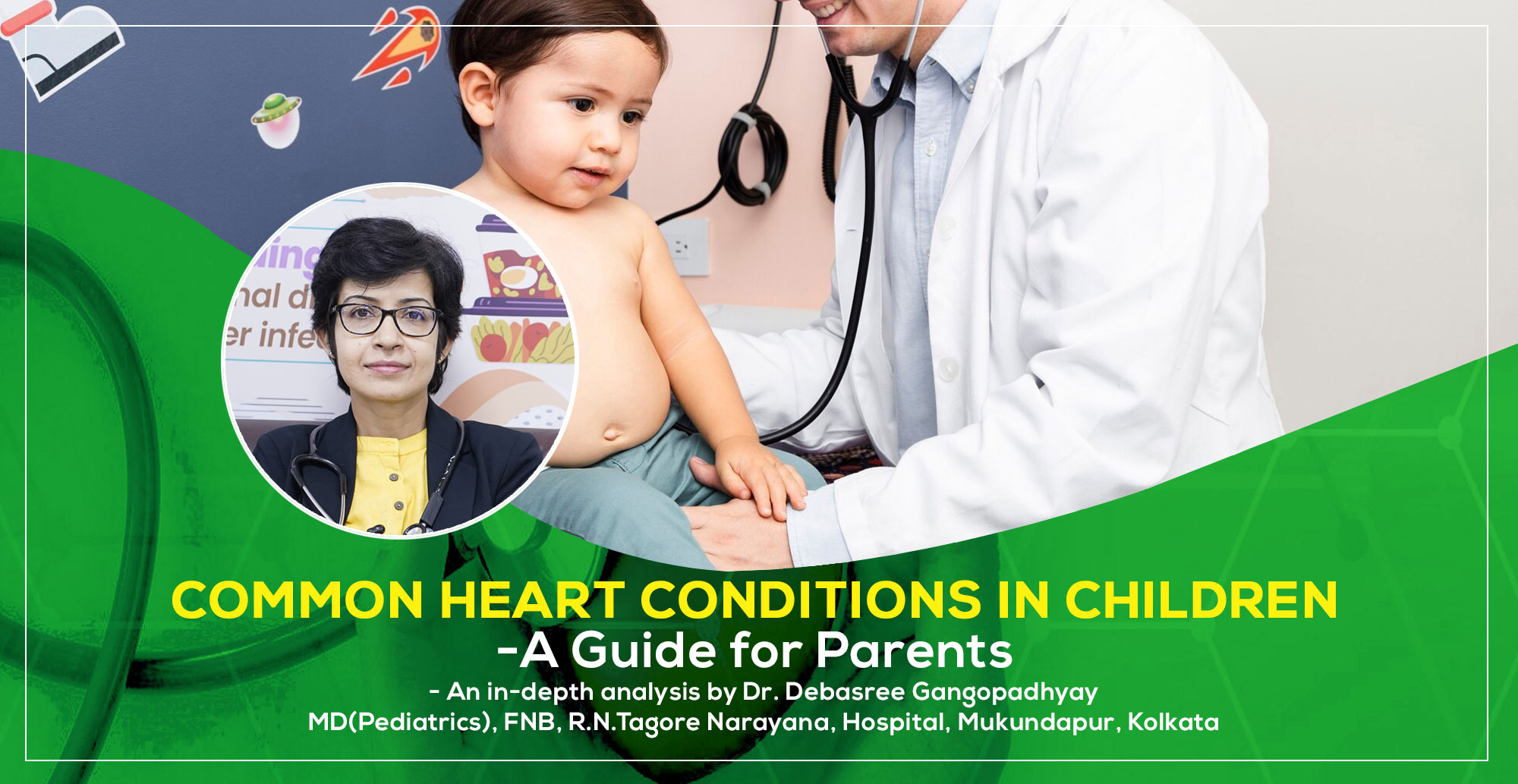Subtotal $0.00
Table of Contents
ToggleCommon Heart Conditions in Children: A Guide for Parents by Dr. Debasree Gangopadhyay, Pediatric Cardiologist in Kolkata
Introduction
Nothing is more important to a parent than your child’s health. When it comes to heart conditions in children, it can be alarming and scary. But understanding the common heart problems kids might face and knowing the signs to watch for can make a big difference. This blog is here to help parents learn about common heart conditions in children, including how to recognize symptoms, seek treatment, and find the right doctors, especially in cities like Kolkata where specialized care is available. With the right information, you can ensure your child gets the care they need.Why Understanding Heart Conditions in Children is Crucial
When it comes to children, heart conditions can sometimes go unnoticed. Early detection and treatment are key to ensuring a healthy and fulfilling life. With the proper care from a Congenital Heart Disease Doctor in Kolkata or a Child Heart Doctor in Kolkata, many children with heart issues can thrive.What are heart conditions in children?
Heart conditions in children can range from congenital defects that are present at birth to issues that develop later, such as arrhythmias. Some heart conditions are minor and can be managed with medication, while others may require surgery or lifelong care.
The Importance of Early Diagnosis
Early diagnosis plays a crucial role in managing heart conditions in children. Detecting the problem early can prevent complications and help doctors create a more effective treatment plan. This is why regular check-ups and prompt attention to any unusual symptoms are important.
Overview of Common Heart Conditions in Children
There are various heart conditions that affect children, ranging from birth defects to conditions that develop over time. Below are the most common ones: Congenital Heart Defects (CHD) Congenital heart defects are structural issues with the heart that are present at birth. They are the most common type of heart condition in children.
Types of Congenital Heart Defects
- Atrial Septal Defect (ASD): A hole in the wall separating the upper chambers of the heart.
- Ventricular Septal Defect (VSD): A hole in the wall between the lower chambers of the heart.
- Patent ductus arteriosus (PDA): an abnormal vascular connection between aorta and pulmonary artery, persisting beyond neonatal period.
- Tetralogy of Fallot: A combination of four defects that affect the heart’s structure and function.
Symptoms of Congenital Heart Defects
Some children show no symptoms, while others may experience:
- Fatigue
- Shortness of breath
- Poor weight gain
- bluish tint to the skin
Rheumatic Heart Disease
Rheumatic heart disease is caused by untreated strep throat, leading to damage to the heart valves.
Symptoms of Rheumatic Heart Disease
- Chest pain
- Shortness of breath
- Swelling in the legs
Arrhythmias
Arrhythmias occur when the heart beats irregularly. This can either be too fast, too slow, or with an uneven rhythm.
Symptoms of Arrhythmias
- Palpitations or fluttering in the chest
- Dizziness or fainting
- Fatigue
Cardiomyopathy
This condition affects the heart muscle, making it harder for the heart to pump blood effectively. It can lead to heart failure if not treated promptly.
Signs to Look For
- Swelling in the abdomen or legs
- Shortness of breath
- Fatigue
Kawasaki Disease
Kawasaki disease is a rare condition that causes inflammation in the blood vessels and can affect the heart if not treated.
How is Congenital Heart Defects (CHD) Diagnosed?
Physical Examination: Usually, a pediatric cardiologist starts with a physical examination to check for any unusual heart sounds. Diagnostic Tests: Further diagnosis may involve:- Echocardiogram: uses ultrasound to create images of the heart.
- Electrocardiogram (ECG): measures the heart’s electrical activity.
- Chest X-ray: provides images of the heart and lungs to detect abnormalities.
Treatment Options for Children with Heart Conditions
Medications Some heart conditions can be managed with medications to control heart rate, rhythm, and blood pressure. Catheter-based Treatments Medical advancements have provided minimally invasive treatment options for CHD, particularly through catheter-based procedures to fix issues like valve problems or holes in the heart. These treatments offer a less invasive alternative to open-heart surgery, leading to faster recovery times and fewer complications. Surgical Interventions Surgery may be required in more severe cases for repairing structural heart defects.The Role of a Congenital Heart Disease Doctor in Kolkata
A Congenital Heart Disease Doctor in Kolkata specializes in diagnosing and treating heart defects in children. They are trained to provide both surgical and non-surgical treatments for congenital heart conditions.Choosing the Right Child Heart Doctor in Kolkata
When selecting a Child Heart Doctor in Kolkata, consider the following: Qualifications Ensure that the doctor has specialized training in pediatric cardiology and congenital heart conditions. Experience Look for a doctor with extensive experience in treating heart conditions in children. Reputation Read reviews and ask for recommendations from other parents or pediatricians to ensure you’re choosing a trusted professional.Post-treatment Care for Children with Heart Conditions
Children who undergo treatment for heart conditions will require proper care. Regular check-ups and monitoring are essential to ensure the heart is functioning properly after treatment.Tips for Parents of Children with Heart Conditions
Caring for a child with a heart condition can be challenging, but with the right approach, you can provide the best support for your child. Some helpful tips for parents:- Educate yourself about your child’s condition: Learn about your child’s heart condition. Understanding the specifics of their diagnosis, treatments, and possible complications can help you feel more confident in managing their care.
- Maintain regular check-ups: Regular check-ups with a pediatric cardiologist are crucial for monitoring heart health.
- Follow a healthy diet for your child: Make sure your children eat a healthy diet like whole grains, fruits, vegetables, and lean protein sources to support heart health.
- Regular Physical Activity: Encourage your child for regular physical activity as recommended by your doctor. Healthy diet and physical activity are great ways to keep the heart healthy.
- The Emotional Impact on Families: Having a child with a heart condition can be emotionally challenging for the entire family. It’s essential to seek emotional support, whether from healthcare professionals, counselors, or support groups.
When to Consult a Pediatric Cardiologist
Parents should consider consulting a pediatric cardiologist in Kolkata if your child shows any signs of heart trouble, such as rapid breathing, poor feeding, or blue-tinged skin, etc. You need to seek immediate medical attention as soon as possible because early diagnosis can lead to effective treatments and better outcomes.Preventative Measures for Children’s Heart Health
Maintaining a heart-healthy lifestyle is essential, even though heart disease is not always prevented. Maintain a healthy diet, regular exercise, and periodic checkups.Conclusion
Children with heart conditions, especially congenital ones, need specialized care. By consulting a Congenital Heart Disease Doctor or a Child Heart Doctor in Kolkata, parents can ensure that their child receives the best possible treatment. With early detection, proper care, and a strong support system, many children with heart conditions can lead healthy and active lives.
Dr. Debasree Gangopadhyay is a highly respected pediatric cardiologist based in Kolkata, India, specializing in the diagnosis and treatment of heart conditions in children. With a compassionate approach and a commitment to excellence, Dr. Gangopadhyay has made significant contributions to the field of pediatric cardiology. Her expertise includes managing congenital heart defects, arrhythmias, and other cardiovascular conditions in young patients. Dr. Gangopadhyay is dedicated to providing personalized care and staying updated with the latest advancements in pediatric cardiology. She is passionate about educating families on heart health and actively participates in research and community outreach programs.




Comments are closed